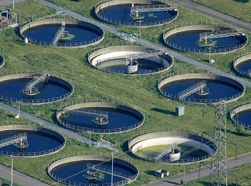The new center is the only facility in the country completely dedicated to the ecosystem science of coral reefs.
Growing Greener Plus Grants Offered by the Pennsylvania DEP
Forest landowners are invited to the Oct. 13 workshop to discuss assessing fire severity and vegetation impacts.
Nancy Rabalais, marine ecologist and executive director of the Louisiana Universities Marine Consortium, won one of 23 new fellowships from the John D. and Catherine T. MacArthur Foundation.
Connie M. Knight, 46, is charged with impersonating a federal employee for the purpose of enticing more than 1,000 people to pay her for fraudulent hazardous waste safety training, so they could work on the Deepwater Horizon oil spill.

To reuse water requires capital that they would rather not spend if it's cheaper for them just to dispose of it. I think that's why we don't reuse that much. It might be more cost effective to figure out a way to reuse it than it would be not to.
The local government is providing $500,000 to help regional councils install solar-powered cameras and rain gauges before the 2012 wet season arrives.
The winners of the 2012 Solutions Exchange awards are Protei and Nonox Ltd.
The actions by the Commerce Department highlight continuing pressures on important fisheries and the economics depending on them.
The law enforcement agency said establishing National Environmental Security Task Forces is an effective way to fight environmental crime.
The company announced it will stop drilling into deepwater zones for this year but will drill the top portions of as many wells as possible during the remaining season, then cap and temporarily abandon them.
The one-hour webinar on Sept. 18 is part of a series presented by CDC, the National Center for Environmental Health/Agency for Toxic Substances and Disease Registry, and the American Public Health Association.
Agrochemicals are a very real threat to the health of the bee population, according to experts.
The National Oceanic and Atmospheric Administration wants to survey residents of Washington and Oregon about the value of the ongoing ecological restoration project -– one of the largest dam removal projects in U.S. history.
Trout in the area already face numerous threats, whether it is climate change, pollution, water extraction for irrigation, or overfishing.
"Our study implies that deforestation of the Amazon and Congo forests could have catastrophic consequences for the people living thousands of kilometers away in surrounding countries," said lead author Dr. Dominick Spracklen.
The results of the study concluded that temperature has the biggest influence on traits such as metabolism and growth rate.
A rail chemical emergency response scenario will be one of the highlights of the Alliance of Hazardous Materials Professionals' 2012 National Conference.
EPA announced the company was sentenced Sept. 7 in an Ohio federal court for 11 criminal violations of the Federal Insecticide, Fungicide, and Rodenticide Act (FIFRA).
A team of 'coralbots', each individually working to simple rules, will piece together damaged bits of coral, allowing them to regrow.